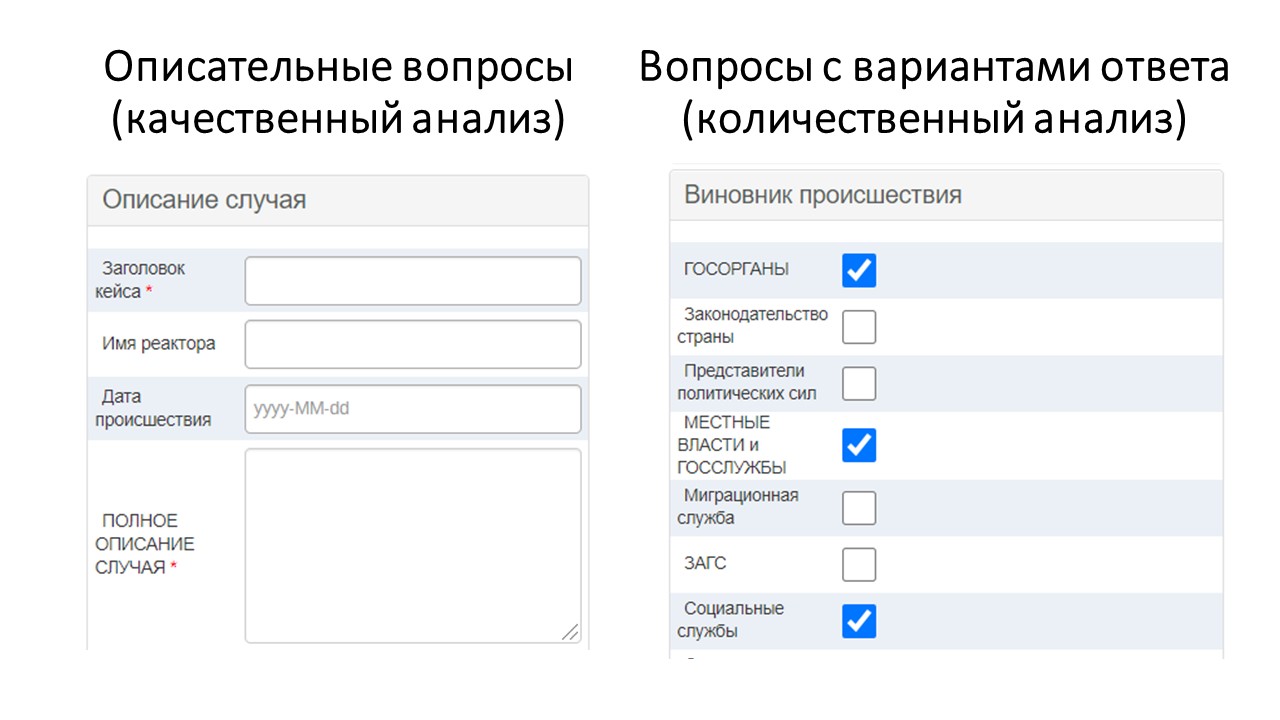Now in its second year, the online system REAct assists human rights defenders in Georgia, Moldova, Kyrgyzstan, Tajikistan and Ukraine to support the people from key groups and from late 2020, such support is also provided in Russia and Uzbekistan.
It should be noted that during the documentation period, the questionnaires in the countries were adapted and improved several times but the most extensive updating of the system functional became available on July 1, 2021.
“We received almost 2000 applications just for the first year. The difficult day-to-day work of 120 REActors-paralegal providing advice and legal assistance to representatives of key groups is growing rapidly. We make all possible modalities for efficient and convenient activities of the REActors. – Victoria Kalyniuk, REAct Regional Coordinator in Eastern Europe and Central Asia countries, explains – The number of member organizations and providing services REActors is steadily increasing in each country. We are confronted daily with new and specific types of violations and seek to broaden the types of services for the clients. For this reason, it is time for a significant upgrade of the online system.”
 Note: In REAct, the cases of human rights violations are documented on the basis of an online questionnaire standardized for the country, which is filled by the REActor after an interview with the victim. The questionnaire consists of a text (narrative ) part for qualitative examination of information and an indicator (“check signs”, which then work as filters and indicators in charts) part for quantitative examination.
Note: In REAct, the cases of human rights violations are documented on the basis of an online questionnaire standardized for the country, which is filled by the REActor after an interview with the victim. The questionnaire consists of a text (narrative ) part for qualitative examination of information and an indicator (“check signs”, which then work as filters and indicators in charts) part for quantitative examination.
During verification of cases, there is periodically a need to complement the questionnaire that it enables to collect information qualitatively and generate statistics quickly that will display a real picture of the specifics of rights violations in any given key group.
Well, what new appeared in the system for the REActors of the EECA countries’ work?
• Communication lines with clients

The issues concern about how the client gets information on services and how he applied (called/wrote in social networks / came in person) have been added. This information will help us understand which communication lines and means of acquiring information worked best in a given country.
• List of key groups was expanded
The system allows you to select several key groups for one client, indeed, in practice, about 25% of clients belong to two or more key groups. In Russia, for example, it became necessary to register homeless people as a separate key group, because exactly the lack of registration is a barrier in accessing ART therapy.
• List of perpetrators and types of incidents was expanded
If we can see by the description of cases that one or another specific perpetrator or type of human rights violation is quite frequent, we make a separate filter in order in the future to be able to quickly find precisely those cases that include this type of perpetrator. For example, in Russia – “Federal National Guard Troops Service”, “Federal Bailiff Service”, in Moldova – “Guardianship and custody bodies”, in Kyrgyzstan – “Souteneur, “mom”, in Tajikistan – “Bureau of civil registration” were added to the list of perpetrators. The specific violations are added to the list of types of violations such as “Unreasonable fines”, “Forced confession”, “Civil rights restrictions on grounds of drug recording” etc.
• There was created a detailed list of subtypes of Refusal in medical care provision and social assistance.

Previously, the system had an overall filter “Refusal in the provision of health-care services” and “Refusal to provide social services”. It had been clear for some time that there needs to be a more detailed list of these subtypes in order to see more clearer in which one healthcare sector refusals due to discrimination most often occur.
• The process of monitoring of the activities of REActors has been optimized by the national coordinator
A separate cluster for financial reporting and for case validation by the coordinator has been created through which the process of calculating the monthly fee of the REActor and compensation of transportation costs will become a lot quicker and a lot easier.
• A library for REActors with useful publications and materials is added .
 • It became possible to do announcements for all REActors within the country
• It became possible to do announcements for all REActors within the country
• The monitoring of the case management by the reactor has been optimized
The dates of the latest updates for the case and the possibility to send a reminder when to update this case have been added. In this way, we could reduce the number of cases that are “in a hang state” in the database and were not updated by the REActors
The standard functional is also available in the database.
• Structured collection and storage of information about cases of criminalization and rights violation
• Instant monitoring of the collected information and provided legal services to the client
• Possibility of instant and teamwork of several specialists on one case to provide an integrated response
• Monitoring of the client redirection to receive medical and social services
• Qualitative and quantitative analysis of cases
• Enhanced visualization capabilities (graphs, diagrams, maps)
• Data application for planning and implementing human rights protection interventions and preventing similar cases in the future
• Evidential base for planning and implementing programs, policies and advocacy initiatives
REAct specificities:
• Online access / offline access / access from mobile phone
• Information saved up in the cloud which rules out data loss
• Confidentiality, strict surveillance of access to the database and two-factor authentication that rule out data theft / breach
• User-friendly interface and availability of different language versions
• Without paid licenses and updates
• Free use, instruction and customer support


